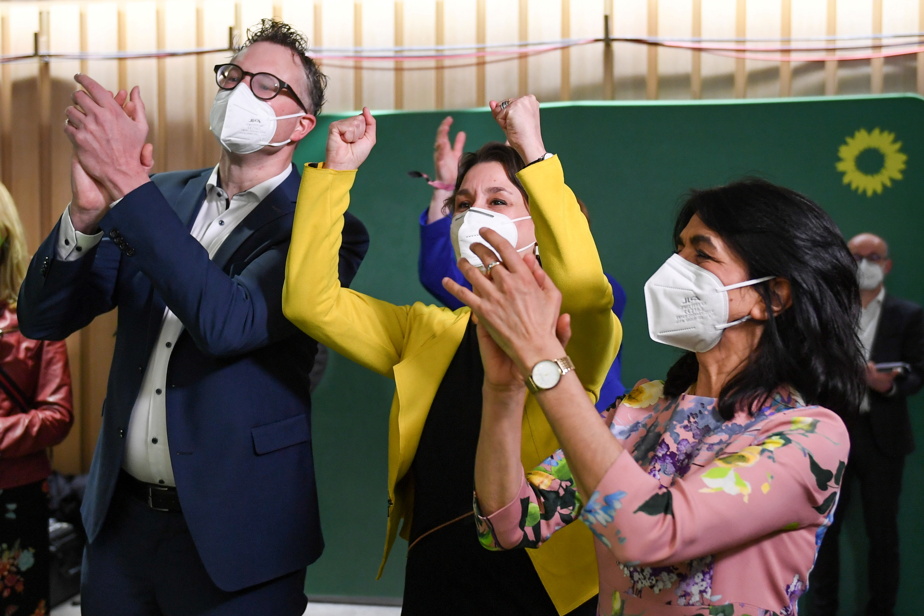(Stuttgart) The German conservatives, mired in a financial scandal and criticized for their response to the COVID-19 pandemic, suffered a scathing electoral defeat on Sunday in two regional states six months away from legislative elections which will have to appoint Angela’s successor Merkel in the chancellery.
Chancellor’s Christian Democratic Union (CDU) has suffered an electoral “disaster”, says Die zeit, “A debacle” such as it shows that “it cannot continue like that”, even warns Der Spiegel.
In fact, in the regional states of Baden-Württemberg and Rhineland-Palatinate, the conservative camp recorded the worst scores in its history, according to projections by ARD and ZDF channels around 10:30 p.m. local time.
The CDU won in Baden-Württemberg only 23.8% to 24.1% of the vote against 27% five years ago, while in Rhineland-Palatinate it reached 26.9% to 27.5%, against 31.8% in 2016.
The conservatives were certainly not the favorites in these two Länder led respectively by the Greens and the Social Democrats of the SPD, but they showed an ominous decline before the legislative elections of September 26.
The cascading revelations since the end of February around the so-called “mask affair” and growing criticism of the management of the health crisis have weakened the Chancellor’s party.
The CDU is going through “its most serious crisis” since the slush fund scandal which precipitated the fall of Helmut Kohl in the late 1990s, according to many commentators. This time, it is in particular suspicion of commissions of several hundred thousand euros collected by deputies in contracts for the purchase of masks, at the start of the epidemic, which tarnishes the image of the majority.
Greens and SPD in the lead
This scandal “heavily impacted” the result of these polls, admitted Sunday evening the secretary general of the CDU Paul Ziemiak while the party leader, Armin Laschet, did not plan to speak until Monday at noon.
The official promised “zero tolerance” in the face of the embezzlement of those “who got richer during the crisis [sanitaire] “.
The Greens, who are aiming for an entry into the federal government at the end of the legislative elections, on the contrary welcomed a “super start” of the electoral sequence marked by their large victory in Baden-Württemberg, a Land they lead. for a decade.
In this region, the heart of the automotive industry, the popular Winfried Kretschmann, 72, improved his score to 32.7%.
The coalition with the CDU, which he has led for five years, is sometimes seen as the laboratory for a possible national alliance following the federal elections.
In the Land of Rhineland-Palatinate, the CDU comes far behind the outgoing leader, Malu Dreyer (SPD, 36%).
The far right Alternative for Germany (AfD) suffered the most severe setback of all parties, peaking at around 8-9%.
Tired of restrictions
After 16 years in power, Angela Merkel could hope to leave a party moving confidently towards the elections, but the CDU and its Bavarian avatar CSU have recently fallen to 30% to 33% of voting intentions, their pre-pandemic level.
Two MPs, Georg Nüsslein (CSU) and Nikolas Löbel (CDU), had to leave their party on suspicion of having enriched themselves by serving as intermediaries with manufacturers in the purchase of anti-COVID-19 masks by the authorities.
Another conservative MP on Thursday resigned his mandate after being blamed for financial ties with Azerbaijan.
This defeat also weighs on the ambitions of Armin Laschet who must convince his people that he will be the best conservative candidate for the chancellery. Bavaria boss Markus Söder (CSU) is ahead of him in the polls.
The “mask affair” is going all the more badly as millions of Germans, a year after the start of the pandemic, are weary of the restrictions.
The difficulties of supplying vaccines against COVID-19, as in the rest of Europe, have only accentuated the discontent, against the backdrop of a rise in contamination in recent days.
The government’s strategy of gradually lifting restrictions through the use of massive tests is also hampered by difficulties in the supply of antigenic tests.
And the health authorities no longer hide their concern at the “beginning of a third wave”.

